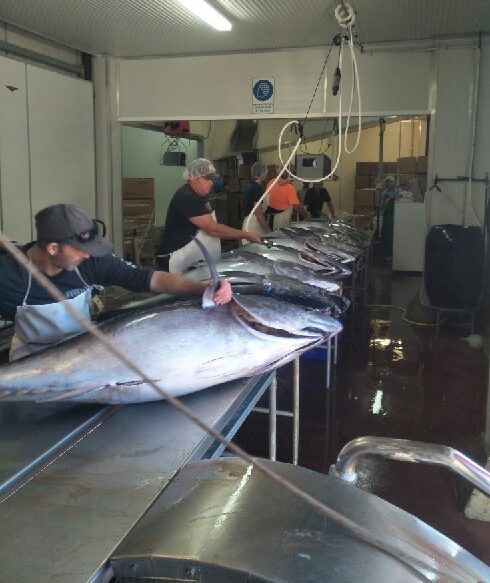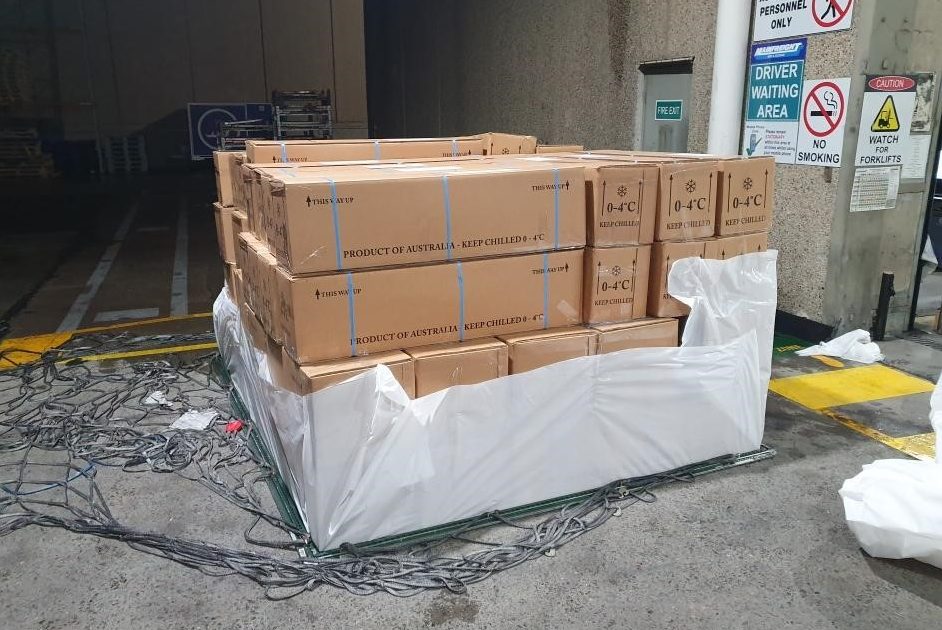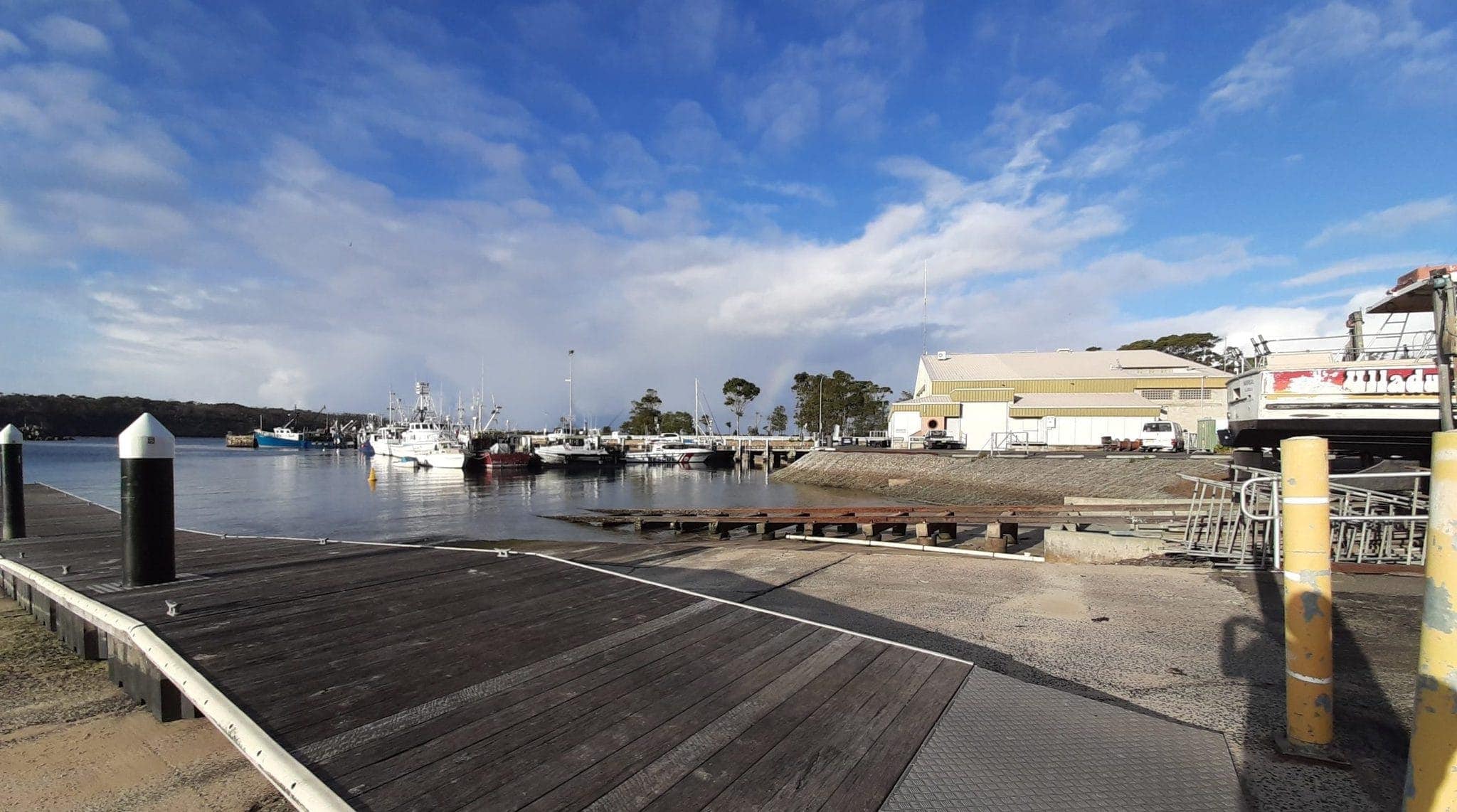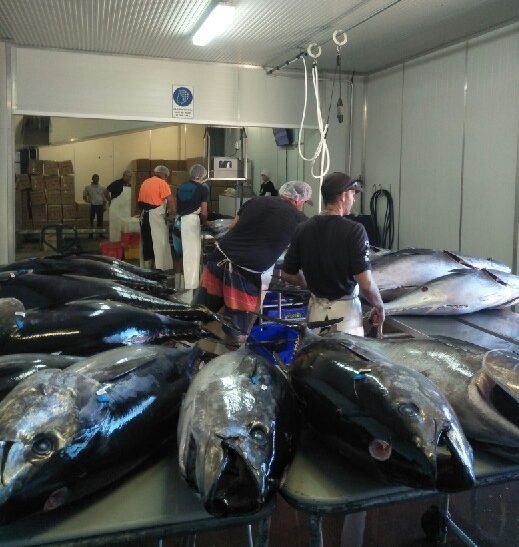Tuna takes to the skies thanks to government’s International Freight Assistance Mechanism
Tuna producers hard hit by the COVID-19 pandemic have welcomed the Australian Government’s International Freight Assistance Mechanism (IFAM) to help re-open supply links to Japan and the United States.
It’s providing some relief for the largely export-focused tuna longline industry, says David Ellis, Tuna Australia CEO.

Tuna being prepared for export at Ulladulla Fishermen’s Co-operative.
“One of our biggest challenges was to adapt from our pre-COVID export model, where flights were freely available and economical, to a complex trade environment where flights are sparse and expensive, and fish markets are volatile,” he said.
“Fishing companies have to gamble on whether they can catch and land fish at a certain time to meet a scheduled air bridge connection.
“However, the IFAM team at AUSTRADE have been very helpful in understanding our challenges and have helped re-connect us to key markets supporting our businesses in these challenging times.
“We are very grateful for the support from the Minister for Fisheries, the Hon. Jonathon Duniam, and the local member for Fisher, Mr. Andrew Wallace.”
Finding solutions
International Freight Co-ordinator General, Michael Byrne told Tuna Australia that these really are extraordinary times.
“There is no playbook for how the future of international supply chains will look,” he said.
As government, as industry, as primary producers – we must work together. We must adapt, adjust and we’ll get through it together.
“Australian businesses, including the seafood industry, have demonstrated ingenuity and true resilience in responding to the pandemic and we know there’s a challenging road ahead as our economy has to adjust to a new reality.
“The Federal Government is very conscious of trying to help and assist tuna producers in a turbulent world.
“Fishing has lots of external factors on it every day, including the weather, the currents, and demand. Throw in COVID-19 and it’s caused a lot of issues.
“With Tuna Australia, we’re trying to work constructively to find solutions for them.”

Boxes of tuna ready for air freight.
‘Definitely helping’
For Lisa Jacobsen, owner of Prime Fish based in the Gold Coast, IFAM is “definitely helping.”
“We wanted it [assistance] and they [the government] gave it to us, and we’re very happy with that,” she told Tuna Australia.
Because of IFAM, we’ve been able to get produce to where it needs to go. Knowing there are weekly flights out of Brisbane helps my business a lot.”
Lisa said her business has used several IFAM flights, including Brisbane–Japan and Brisbane–Los Angeles.
But she acknowledged that the “enormous costs” of the assisted flights are “still not helping the bottom line.”
The flights to Japan are nearly double what we were paying before COVID-19 hit, and flights to LAX are double or more. Flights to other destinations are even more.
“The high costs, along with having to fish to the flight schedules, are just more obstacles we have to deal with to stay operational.”
Lisa said the looming challenge will be “when we get busy.”
“Traditionally, July, August and September are good months for us. It will be interesting to see if we can get the space we need, when we need to send a hell of a lot more fish. It’s an unknown.”
“We’re scrambling every week to find airspace. But we’ll continue to make do until the international borders open and the passenger flights start coming back,” she said.
‘We really need this assistance’

Ulladulla Fisherman’s Co-operative. Photo by Jason Apps.
For the Ulladulla Fisherman’s Cooperative based on the NSW south coast, IFAM support is enabling tuna producers to access the traditional Japanese fresh market.
“We’ve been using the Sydney–Tokyo flights every Tuesday and Wednesday,” said general manager Jason Apps. “The reduced freight costs have provided some relief, allowing fishing companies to export fish.”
“I’ve heard that IFAM will offer some extra flights to Japan further assisting more competitive pricing for the industry. That will really help,” he told Tuna Australia.
Timing is the key for flights to Japan, said Jason.
“Arrival time determines whether fish make it to the auction floor or have to sit around for another 24hrs before being sold.

Tuna being prepared for export at Ulladulla Fishermen’s Co-operative.
“The market is soft and the longer the fish sits around the lower the market price will be, which in these difficult times will determine whether it is economically viable to send tuna to Japan.”
Jason added, “Another challenge is that there’s no flight from Sydney to Los Angeles and New York. We really need that as the current freight rates to the US are too expensive.”
Jason said it’s unfortunate that the government’s support may be ending soon.
“There’s another six weeks left of Qantas flights, and four more weeks of Japan Airlines flights.
“We really need this assistance to keep going for eight to 10 weeks when the bluefin tuna are running, and then for yellowfin tuna, which we expect will go until the end of October.”
Jason said that even now, with the assistance and the low market prices, it’s still not viable for some boats to export their products.
If the assistance ends, fishers will have to decide whether to go fishing. Because if the freight costs go up, it won’t be profitable.
‘Happy in these times of need’
Heidi Walker, owner of Walker Seafoods based in Mooloolaba, commended the government for consulting the industry when developing IFAM.
“They did good consultation with us and the industry. They put the flights on when we [the industry] figured we could use them best,” Heidi told Tuna Australia.
The government is doing the best job that they can in these difficult times. It’s good that we’ve been listened to as an industry.”
Heidi said her business has been using the Brisbane–Los Angeles and Brisbane–Tokyo IFAM flights, departing every weekend.
“It’s good to know the flights are there. We can rearrange our unloads in line with when the flights leave.
The flights are a little bit more expensive than before the pandemic hit, but it’s definitely workable. We’re happy with the IFAM flights in these times of need.
Heidi said that Walker Seafoods is now doing 10 percent of what they would normally do at this time of year.
“We would export more but we’re limited by the flights. For instance, I tried to get fish to Hawaii last week but couldn’t get connecting flights from LA to Hawaii.
“We also need flights at different times of the week and not just on weekends,” she added.
She expects that “things won’t change” anytime soon, exacerbating the hardship already faced by Australian tuna operators.
It’s scary times for our industry—we’ll be hurting for at least another 12 months.”
‘A reasonable turnover’
Cathal Farrell, owner of Upscale Seafoods based in Coffs Harbour, told Tuna Australia that the IFAM support has “been good.”
“It’s made booking flights absolutely easier, created more availability and reduced the competition for existing airspace,” said Cathal, whose business has used the Brisbane–Los Angeles and Brisbane–Narita IFAM flights.
“When COVID-19 restrictions were first introduced, the air freight price increases were severe. The Government assistance has helped to reduce prices on certain routes, which is a positive.”
The IFAM flights have allowed Upscale Seafoods to “do a reasonable turnover.”
Even though costs are up and freight availability has gone down, we can still do a certain amount of turnover to keep our business liquid.
Even with the assisted flights, Cathal said the hardest parts of operating during COVID-19 are “the unknowns.”
“While the borders are closed and people aren’t getting on planes, the landscape will be with us for the foreseeable future.
“It’s created a lot of unknowns, so we’re trying to make decisions with only partial information.”